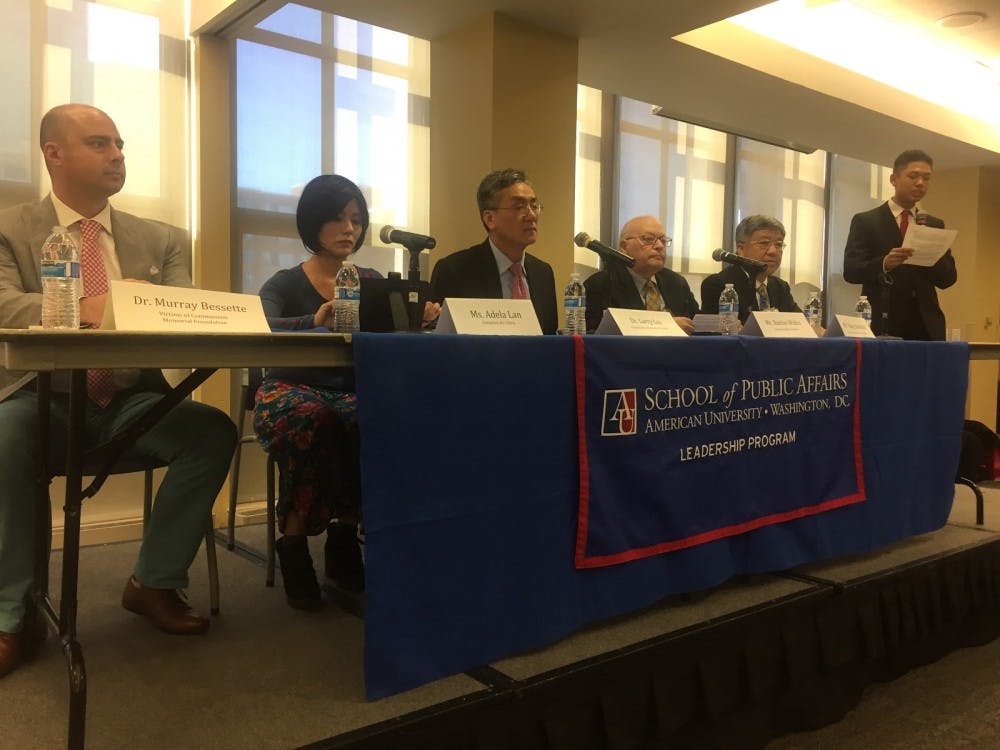Scholars and activists gathered at AU on March 29 to discuss political persecution, organ harvesting and human rights in China.
Murray Bessette, director of academic programs at the Victims of Communism Memorial Foundation, hosted the panel of speakers that included Adela Lan of Initiatives for China, Larry Liu of Falun Dafa Information Center, Burton Wides of Human Rights Legal Counsel and Ning Xianhua, a former political prisoner in China.
Jason Lin, a sophomore in the School of International Studies, created the event to shed light on China’s political persecution, censorship and organ harvesting.
“In light of China’s ongoing violations of human rights, I felt compelled to speak out against the regime and bring together scholars and activists to reveal a narrative to the AU community, often censored abroad or self-censored as a result of pressure from Chinese soft power,” Lin said.
China’s organ harvesting trade involves forced organ harvesting or political prisoners and minorities to be sold on the black market.
“In September 2013, the Organ Transplant Institution for Peking University told China Economic Weekly that the hospital conducted 12,000 liver and kidney transplants within the particular year,” Liu said. “All of the organs were from prisoners sentenced to death.”
Liu said that the Chinese government claims that only 10,000 organ transplants occur per year. In 2007, only 169 hospitals were licensed to conduct organ transplants. More than 600 hospitals had conducted them without a license, he said.
There are two components of organ transplants in China that are very different from the process in the rest of the world and signal abnormalities in China, Liu said.
Liu said that the first component is that transplants require a very short waiting time of weeks or even days, which he said could only be possible with a large bank where organs can be harvested from. The second aspect is that there was not an organ donation program in the country until 2013.
Ning Xianhua, a former political prisoner, is very familiar with what prison life is like in China. “I have been detained many times and arrested five times,” Xianhua said.
In 2013, due to his involvement with creating human rights groups, Xianhua was arrested and placed in jail. Xianhua said the conditions there were dismal; he received soup that was almost water as food, would have to sleep on boards, received very little daylight and was denied visits while in prison due to his political activity.
“The treatment there was very inhumane,” Xianhua said. “I had a black bag over my head during all of the investigations and only allowed to wear underwear or whatever they gave us.”
Wides, a representative from Human Rights Legal Counsel, described the situation in China as a brutal dictatorship, oppressive and a nightmare for ethnic minorities.
“No independent minded person can go to bed in China feeling comfortable,” Wides said.
He expressed that Americans that are not familiar with the issue have no idea of how extreme the situation is. One of the reasons for this is how much power the Chinese government has on what people hear, see and read about China. Wides described the government as having great control over what information is released.
“As a society of people who can speak freely and live without fear of political persecution, it is our responsibility to ensure that others have the same because just like them, we had generations of activists and revolutionaries that have worked to secure the liberties that we presently have,” Lin said. “It is time for us to pay it forward.”
Fatima Tariq, a freshman in the School of International Studies, was glad to see the discussion panel taking place at AU. She believes that such panels give insight to what is happening in the world and make her grateful for her surroundings, as well as her rights.
“Humans work to improve their lives, but for people in developing countries such as China, it’s contradictory,” Tariq said. “Working improves their economic lives, but impacts their rights as humans.”
The discussion panel was followed by a screening of the movie “The Bleeding Edge,” which provides insight about organ harvesting.
For those who would like to help, Lin suggested becoming up to date on human rights violations in China, and reaching out to nonprofits such as China Aid and Initiatives for China to get involved.
“We can reach out to our elected officials to take a stand against these atrocities abroad and work towards advancing human rights in China,” Lin said.





